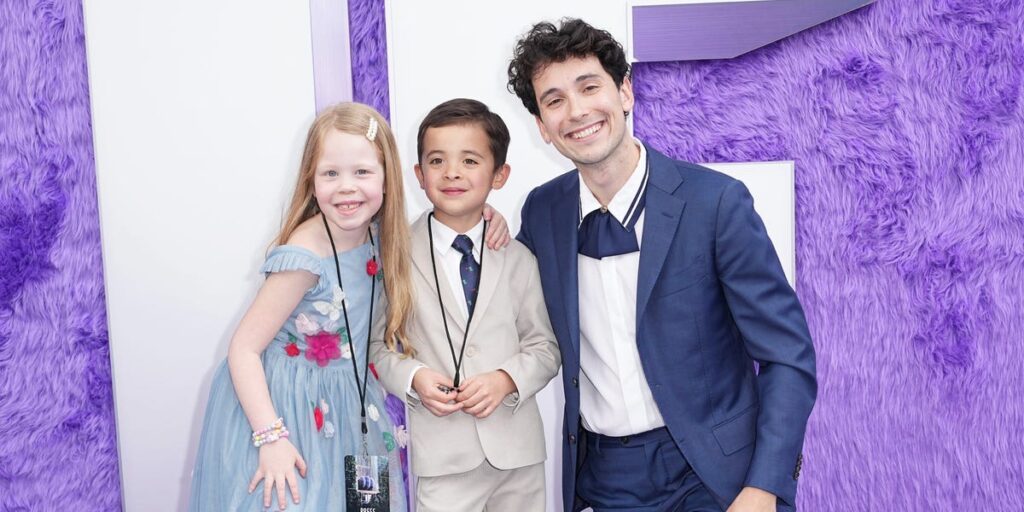- Amazon is looking for ways to market itself outside the traditional TV spot under exec Amy Powell.
- Paramount vet Powell described how she’s drawing on her Hollywood background to market the company.
- She also teased a new show with “Recess Therapy” creator Julian Shapiro-Barnum.
On Monday, Amazon is set to announce “Celebrity Substitute,” a new show with Julian Shapiro-Barnum, the 25-year-old comedian and actor of the online hit “Recess Therapy.” And while people may tune in to see Shapiro-Barnum, known for his rapport with kids, Amazon hopes they’ll come away thinking of Amazon as a force for good.
“It involves Julian, how Amazon gives back to the community, schools, teachers,” Amy Powell, head of entertainment marketing at Amazon, said recently when describing the concept. “When you see real children, not actors, rip open an Amazon box and experience the delight and joy they get from something that Julian has brought into their school and into their community, it’s this authentic reaction you can’t recreate. It’s Christmas morning every time Julian brings them things that they want and need.”
Speaking during a panel with Shapiro-Barnum at Advertising Week in New York earlier this month, Powell said “Celebrity Substitute” would launch on social and digital channels like YouTube but that the hope was to extend it to other forms like a sitcom and unscripted show.
She contrasted this approach with traditional studios, which have generally viewed digital platforms like YouTube as competition for their audiences.
“Hopefully we’re seeing this character we’ve created and the joy that he brings children on many screens existing together and not competing with each other but actually telling a more complete story,” she said.
The upcoming show is one of many ways Powell is working to integrate Amazon’s brand into entertainment, drawing on her Hollywood background. Before joining Amazon in 2022, she headed Paramount Television, where she produced popular TV shows, including “Jack Ryan” and “13 Reasons Why,” after leading its digital marketing and content strategy.
In addition to “Celebrity Substitute,” Powell’s team got YouTube’s top creator, MrBeast, to promote Prime Day with a YouTube Short, posted in July, that combines MrBeast’s prank-style videos with Amazon deliveries.
And beyond social media, Amazon is using its own massive entertainment platform to promote its brand. In November, Prime Video will release the Nick Cannon-hosted “Wish List Games,” where people will compete to win everything on their Amazon Wish List.
“Wish List Games” is part of a new fall Prime Video game show lineup that includes “Buy It Now,” a competition-style show where Amazon executives and celebrities judge entrepreneurs’ products, with the winners sold in an Amazon store. (Powell wasn’t involved in that project.)
Amazon wants to reach people without annoying ads
Amazon’s efforts are part of a trend of companies — including the likes of Procter & Gamble and Marriott — using branded entertainment to boost their awareness and polish their image outside the traditional TV spot or social-media buy.
Amazon doesn’t need to tell people who it is, and it tends to rank high in consumer polls. But it’s also faced criticism on various issues, from worker treatment to allegations of anti-competitive practices. While it dominates e-commerce, Google, TikTok, and Walmart are competing for a piece of online sales. So, entertainment can potentially serve to help cast the company in a positive light and, in the case of “Buy It Now,” get people to shop on the platform.
Powell said she was looking for ways to reach shoppers without interrupting them.
“What’s become really apparent to us is, younger customers are consuming content outside the ad pod,” she said. “So how can we get the values of Amazon into content directly and seamlessly and authentically and speaking to our customer in a way that resonates versus just a big 30-second ad spot?”
Powell said Amazon has an advantage over some other brands because it is relatively easy to integrate its products into stories without it feeling forced.
“Fortunately, at Amazon, we’re such a ubiquitous brand that we’re able to find those touchpoints that are authentic to our customers’ real-life experience, and our most valuable assets are our boxes and smile logo that hopefully tonally also tap into this idea of spreading joy,” Powell said. “So, what we are looking to do is take our most valuable branded assets, which are those boxes or the drivers, vans, boxes, and bring them into storytelling that is authentic to how you would experience it in real life.”


